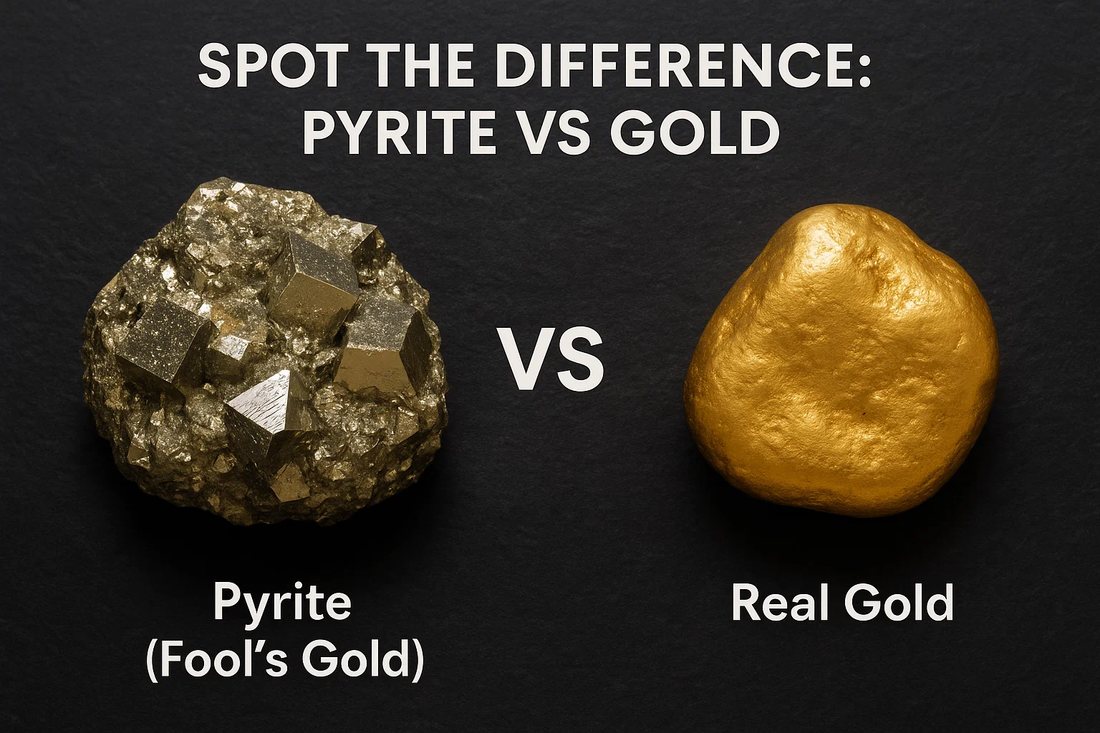
Pyrite vs Gold: How to Tell the Difference
Share
Have you ever stumbled upon a shiny, golden rock and thought you found gold only to find out it was pyrite, also known as fool's gold? You're not alone. Confusion between pyrite and gold is extremely common because of their similar appearance.
In this guide, we'll help you identify pyrite, understand its main differences from real gold, and avoid being fooled again.
What is Pyrite (Fool's Gold)?
Pyrite, chemically called iron sulfide (FeS2), is a common mineral that resembles gold. Because of its golden metallic sheen, it is often mistaken for real gold, hence its nickname fool's gold.
Pyrite vs Gold: Key Differences Table
| Feature | Gold | Pyrite (Fool's Gold) |
|---|---|---|
| Color & Shine | Rich, buttery yellow with soft metallic glow | Brass-yellow with a shiny, glitter-like sparkle |
| Hardness (Mohs) | 2.5 – 3 (soft) | 6 – 6.5 (harder than gold) |
| Shape & Structure | Irregular nuggets or flakes | Sharp-edged cubes or crystalline structures |
| Streak Test | Leaves a golden-yellow streak on porcelain tile | Leaves a greenish-black or brown streak |
| Weight (Density) | Heavy; high density | Lighter compared to gold of same size |
| Flexibility | Malleable; can be bent easily | Brittle; breaks or shatters when struck |
| Sparkle Effect | Dull, warm glow (non-sparkly) | Bright, glittery reflection |
| Real-world Use | Precious metal used in jewelry and investment | Decorative stone or collector’s mineral |
Why it's important to know the difference
Many gold seekers and stone collectors have been deceived by confusing real gold with fool's gold. Even in jewelry markets, mistaken identity can lead to scams. Correctly identifying pyrite saves money, time and frustration.
Quick Checklist: How to Identify Pyrite
- Light brass color
- Shiny, bright luster
- Forms as cubes or crystals
- Green/black streaks
- Lighter in weight
- Harder than gold
Real World Examples
-
Collectors: Pyrite is popular in crystal shops, but don't pay too much for it,
thinking it's rare. - Mining: Geologists often find pyrite near gold deposits, but it's rarely valuable.
-
Jewelry Buyers: Some people use pyrite for decoration, but it has no investment
value like gold.
Final Thoughts: Don't be fooled!
Now that you understand the difference between pyrite and gold, you're much less likely
to be fooled by a shiny appearance. When in doubt, test the streaks, check the weight,
and look at the crystal structure.
Remember: Gold sparkles. Pyrite glitters.
Frequently Asked Questions: Pyrite vs. Gold
Q: Does pyrite have any value?
A: Pyrite has value as a mineral in the metaphysical market and to collectors, but it is not considered as precious as gold.
Q: Can you find pyrite in gold mines?
A: Yes, but the presence of pyrite does not always mean that gold is nearby.
Q: Is pyrite used in real gold jewelry?
A: Pyrite is sometimes used as a decorative stone, but it is clearly labeled and sells for a very low price.

